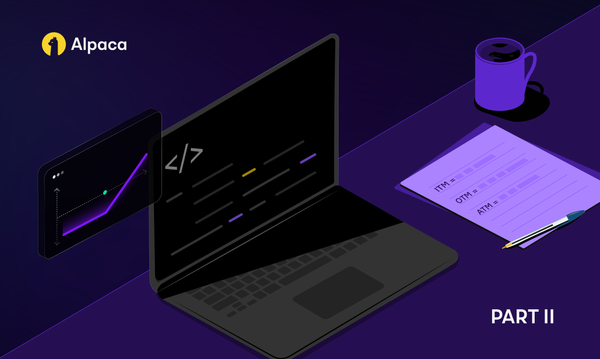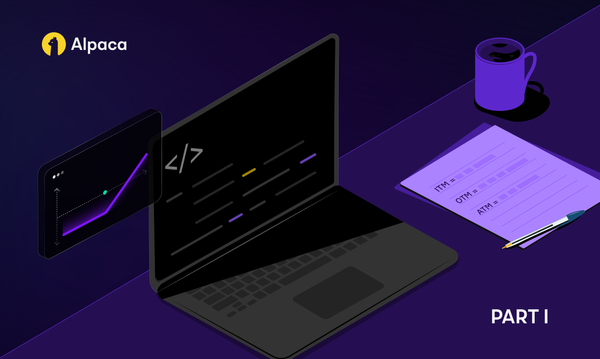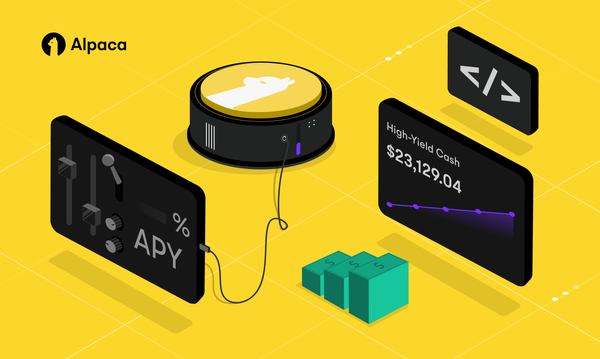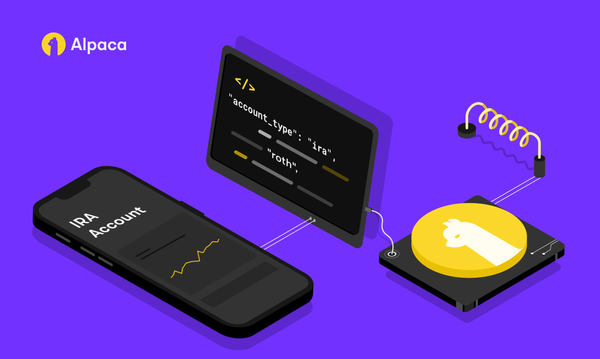Joe Percoco from TITAN #005
On our fifth episode of Fintech Underground by Alpaca we interviewed Joe Percoco; Co-CEO and Co-founder of Titan, an investment platform.
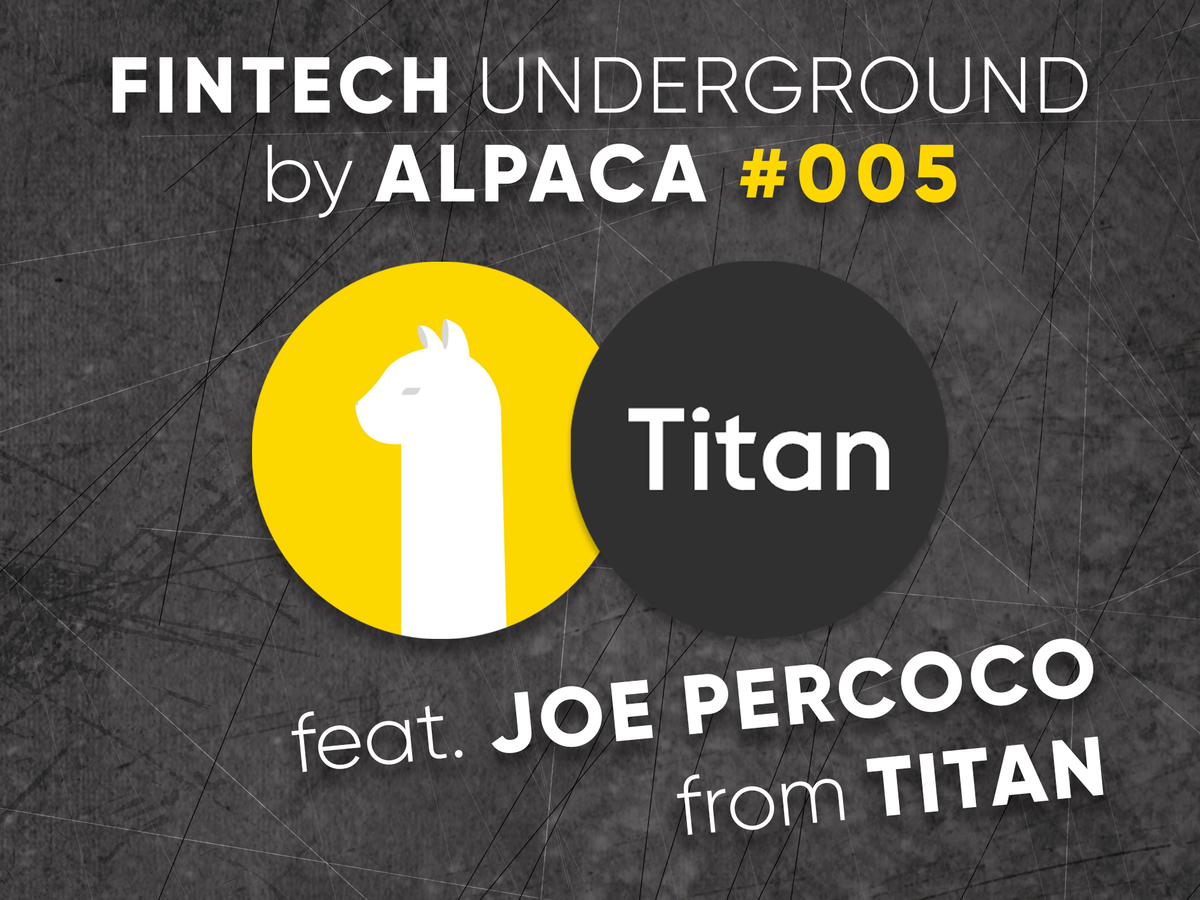
Any opinions expressed are opinions of the host and their guests. Alpaca Securities LLC does not recommend any specific investments or investment strategies.
Fintech Underground by Alpaca is a podcast devoted to all topics related to stock trading and APIs. From trading with algorithms or connecting apps or building out services, we aim to bring light to the different corners of Fintech.

TL;DR
On our fifth episode of Fintech Underground by Alpaca we interviewed Joe Percoco. As the Co-CEO and CoFounder of Titan, an investment platform, Joe discusses his experience at Goldman Sachs along with Titan’s recent growth, series funding, future plans.
Summary
As the Co-CEO and Cofounder of Titan, Joe Percoco started off his career at Goldman Sachs and McKinsey, where he worked in the investments space. From there he co-founded Titan, an investment platform in 2017. Joe joined us on Fintech Underground to talk about his experience starting Titan and being a Y Combinator alum. Finally, he discusses some of their biggest challenges to date as they have grown and the lessons learned. All in all, despite the challenges, Joe reflects how Fintech is worth it due to the importance of financial health.
Find the full transcript below. To hear more CEO/Founders of the most interesting Fintech companies speak about their experience in the industry check out our other episodes below
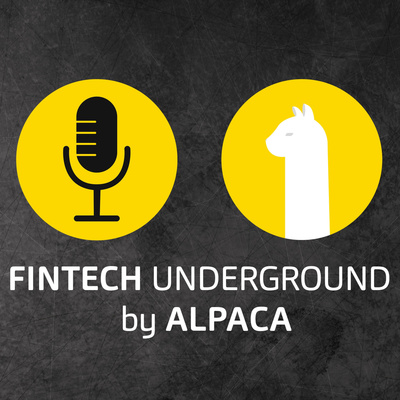
Full Transcript
Jason: Welcome to Fintech underground by Alpaca, a podcast devoted to stock trading API from trading, with algorithms to connecting apps, to building off services. Alpaca is built for developers and traders. And with that being said, let's get started. Hello everybody. Welcome back to FinTech underground by alpaca.
[00:00:18] In each episode, we explore a different area within FinTech today's episode features Joe Percoco, the co-founder and co-CEO of Titan. An investment platform for everyone, I would like to also introduce our hosts, Yoshi CEO and co-founder of alpaca. From Joe's background at Goldman Sachs has experience in the FinTech industry we dive deep into Titan's recent growth series funding and future plans. With that being said, let's get started
[00:00:45] Yoshi: Hi what's up, Joe, how are you, man
[00:00:46] Joe: What's going on Yoshi? How is everything?
[00:00:49] Yoshi: Great. Like, you know, knowing you're chatting to you about a lot of things, but firstly congrats on the series, A funding round announcement.
[00:00:55] Joe: Appreciate it. It's you know, the journey marches on. So it's great to be able to. Do it right. And not just be seven people in a garage.
[00:01:05] Yoshi: Well, like, you know, as I hear like from a bunch of the investors and the users that you're growing, like super-fast, but like, you do want to quickly introduce, you know, what you do at Titan.
[00:01:14]You know, I can talk about it for a long time, but I think better than you do the YC style, quick pitch.
[00:01:20] Joe: I'm Joe. I co-founded a company called Titan I'm the co-CEO. In terms of my job responsibilities, largely get out of everyone. Else's way. Who's way better than me internally. And I just help pitch in on whatever they need, frankly.
[00:01:34] Yoshi: That's great. That's great. Like, you know, I see that you know, a lot of people are putting money into your app, but like, Why is that?
[00:01:39]Joe: That's a great question. Why are 25,000 strangers downloading us in the app store and forking over on average? You know, like $15,000 each. Yeah. So with Titan, we're an investment platform for everyone.
[00:01:57] So if you think about, you know, there are three predominant investing use cases. One, I hate investing, but it's critical to my health. Make it go away. Since passive products are exceptional for that business. I know. Second is. Get out of my way, I'm going to do precisely what I want when I won’t move over.
[00:02:18] Brokerage platforms are great for that. So there's Robinhood, TD Ameritrade, you name it. Then there's a third use case, which is, I want to do this whole thing called investing, but I want somebody to do it for me. Historically, there are things like mutual funds, hedge funds, private equity ventures. Our generation is either locked out or categorically rejecting either of those options, the Titans firmly building in that third use case to be the investment firm.
[00:02:44] Yoshi: Right. Because like, you know, you started your career at Goldman and that you were also at a hedge fund, but like, you know, how did that shape your what you're doing from working in the prestigious investment bank?
[00:02:56] Joe: It was pretty crazy, honestly. I had a really eye-opening moment when, you know, I realized all my friends back home, friends, and family in New Jersey were just asking me what to do with their money.
[00:03:07] And I would say, I would just put it in stocks or buy an ETF. Like you, you, you won't be able to get into the vehicles that my peers and me work for here in New York. So just do this all ETF stock, then go for it. And then I'm like, wait, like, that's actually like pretty terrible that that's the answer.
[00:03:23] And I realized like wall street and investing has this front restaurant back of restaurant divide. If you have like sub 20 million of net worth, you get seated in the front of the restaurant, you're given a vanilla menu. And on that menu, stocks, ETFs, brokerage apps, you name it. And it's like, okay, just pick one and leave whenever you're done.
[00:03:42] And then as soon as you're wealthy, they, the waiter tapped you on the shoulder. They bring you through the kitchen, to the back of the restaurant, and you just switch-a-roo of the menu. They say here, Yoshi, let me take that menu from you. Here's the real one. Hedge funds page one through 10 VC, page 10 to 20 private equity thereafter.
[00:04:01] Tell us what you want. We have a recommendation for you. Chef's waiting to speak to you. And I was like, we need to build a back of the restaurant vehicle for everyone sitting in the front. And so I realized it was just a problem. We're spending a decade on to solve.
[00:04:17] Yoshi: I think like a lot of people, including Robinhood talk about basic democratization and I believe Robinhood did a beautiful job with this basically trading app.
[00:04:25] But I think like, you know, at least from my understanding, like you did this like the beautiful presentation of why you do and like, you know, your value prop on the trading app, like using videos. You know, introduction and explanation doing all sorts of things. What is your aha moment like, okay, this is going to be radically different?
[00:04:44] Like, you know, while a lot of people want to say they're democratizing and making access to everyone. What was your aha moment doing that in your own unique way?
[00:04:52] Joe: It was just like the word innovation and democratizing has been used a lot. And I feel like to really understand the paradigm of what democratize means you have to have lived both sides, like just conceptually in the term, democratize.
[00:05:08] There is something that is not currently being disseminated to everyone else. Hence to democratize, you must know both A and B and to say like the brokerage category was democratizing something. I guess the question I would just push back to those players would be what was previously locked. And so, and I don't say that in a negative context, I say it from the way of when, you know, the reason why I was so frustrated and why I set out to start Titan was that this was like true, pure bulls-eye democratization.
[00:05:42] If you are poor, you will get categorically rejected by the entire asset class. The goal is to democratize that asset class.
[00:05:50] Yoshi: No, I appreciate that. Like, I always think about the same thing because like I see the word democratization, like too much. Cause we were in the world and I appreciate your, like, you know, you agree on that.
[00:06:00] Joe: I'm curious where else you see it. But yeah, it almost makes me allergic in a way anytime I read it because yeah, it's like there are actual things that need to be democratized. And it's sort of like, they get swept under the rug because everything else is using the term democratized, but now it's, there's like a, there's a lot of work we all need to do to make sure that things that need to be democratized are actually democratized.
[00:06:23] Yoshi: Right. And also like, you know, just beginning into like, you know, how you came up with the Titan and started it, you know, you explained about like, you know, this needing to know about A and B to actually define what the democratization is, but how do you think that what's really important to start building.
[00:06:40] This you know, super sexy, cool Fintech application in this era. Do you think like, you know, it requires you to go through all those you know, basically Goldman Sachs experience McKinsey's experience or like, you know, do you think otherwise,
[00:06:52] Joe: I think like with, it's probably a subject that applies across industries, do you have the prerequisite domain expertise to do something?
[00:07:01] And that is probably heightened in regulated industries. And then that is also heightened. One more degree in industries where you're a fiduciary. And so this can be the legal geek, 15 seconds of the podcast, but summarizing US law for, in terms of like regulation, you can go sell whatever t-shirt you want.
[00:07:21] Even if your customers are walking out with the ugliest t-shirts in the world, no one's going to blame you for it. That was their fault. They picked the ugliest t-shirts you can feel free to sell those t-shirts if, as a fiduciary. You're selling your clients bad products for them. The US government raises the bar.
[00:07:37] They said, no, like the way we need to operate in society, means it's required that people have solid financial health. So even if they come clamoring to you for really ugly financial products, as a fiduciary, you at least need to do the job of explaining to them why that's not necessarily good for them. And so, hence just because the bar is higher, it almost requires a much higher Bar of domain expertise.
[00:08:00] So building a there's a variety of different complexities in terms of like, which aspect of trading or investing app you'd like to build. If you're looking to just do like a passive Robo app. You really just have to borrow the thinking and financial products of like Vanguard and Schwab. Let me package them together.
[00:08:16] There are research papers or create a cute brand I'm out. If you're like, I want to rebuild from the ground up. What venture capital means for unaccredited investors. You have to understand the law. You have to understand how to build these things. You have to have a fiduciary attitude. So I definitely am encouraging of people pursuing innovation at these problems because they're just so much work, but definitely, one needs to be smart and have the expertise about it,
[00:08:42] Yoshi: But you'd touch the fiduciary responsibility. And those are the legal compliance perspective of that. So going through the Goldman and the McKinsey, like you know them, Bigger firms. And then you're actually starting and building your own financial services. How was your experience like you know, going through the regulatory prospect? Because personally, I didn't learn anything.
[00:09:02] When I used to work at Lehman brothers investment banks. And like, I was like, Whoa,
[00:09:07] Joe: Probably the biggest thing I learned from Goldman and McKinsey that I still maintain today, they were just, you know, institutions that valued excellence, running highly complex processes. Goldman live M&A execution, IPO's McKinsey strategy projects for several companies you've probably heard of, and ultimately standing up, you know, a registered investment advisor.
[00:09:33] And soon-to-be broker-dealer is just one more big, hairy, complex, intense process requiring a high degree of caliber. Where there's a lot of ambiguity. And so if anything, I was very privileged at a young age just to get so many, at-bats doing that under the guides, mentors, and really awesome CEOs. And it's a muscle that, you know, I'm trying to train each Titan.
[00:09:55] We bring on as employees like yours. Here's how to do it. Here's good process management, team management. Here's how to make decisions with ambiguity, all that strategy
[00:10:03]Yoshi: It wasn't that difficult going through those training in a way to now, like starting to build the investment advisor and broker-dealer from zero.
[00:10:12] Joe: There were definitely challenges. If I, if I were to say, or was it a walk in the park? I would definitely be mis-marketing it. No, it had it, it had its own set of challenges. Like it was definitely a lot of work in particular when you're going from zero to one on any subject in particular one that's very hairy.
[00:10:29] You know, you need to ask a lot of questions. You need to be ready to say, I don't know, a million times, but ultimately if you can find the right thought leaders that sort of like the shoot and ladder effect. So it's like just the idea of leverage. Like, okay. There is a hairy, complex problem I need to solve.
[00:10:44] There's probably someone who has already solved it. Find set human. You're already, you know, 90% of the way there versus trying to do it myself. So long-winded way of saying Titan stands on the shoulders of giants. You know, it's a tribe. Lots of people have helped us
[00:10:57] Yoshi: interesting way to think about it because you know, I think us going through the broker-dealer process, like two years ago, I really had to read a lot of books like series seven for dummies and, I need to educate myself you know,
[00:11:11] Joe: Yeah, exactly. Find a Khan Academy, a class on broker-dealers. Amazing. You should, yeah, I, ironically enough, I read the like investment company act of 1940, that one I had to read for BD has been finding core thought leaders, but. You know, you still gotta be able to dance around the ropes yourself, you know, when you care a lot, which is a byproduct.
[00:11:35] Yoshi: Definitely. Definitely like, you know, I, I feel like, you know, reading those things, it's like learning the history 1933, 1934 and whatnot.
[00:11:42] Joe: Great. Lots of rich history. I feel like we might need a few updates. Yeah.
[00:11:47] Yoshi: And also, like, I wanted to touch a little bit on the Y Combinator because I think like, you know a lot of people, so wonder about like what we learn.
[00:11:55] And like, you know, what we experience at the, you know, during the Y Combinator program, like, what do you think was the best learning that you had and the experience you had going through that?
[00:12:05] Joe: Probably the idea of speed, the humility, and recognition that everything you think and believe is just a hypothesis.
[00:12:12] And so, you know, you can either think about it a lot or you can just ship and get data on it and figure out if you're right or wrong. The concept of velocity I've come to realize is probably one of, if not the most important variable that correlates to success amongst businesses like you and me, and probably the first, most important variable.
[00:12:34] If not that one would just be, are you right or wrong on your thesis about the world? I don't know. What do you think from your Y Combinator journey?
[00:12:42] Yoshi: I think it, you said it beautifully. I think the concept of speed and velocity, and I think you said the words humility and recognition. I think I felt a lot like this every two weeks sprint where you kind of declare yourself your goal, and if you didn't achieve it, you basically, you got, Oh man, it's like humility.
[00:12:59] Yep. And you actually achieved this, like, you know, dream milestones, like recognition. So like, yeah, that's true. That is the kind of this super short sprint and the velocity, you have to kind of commit to it regardless of what the outcome is.
[00:13:12] Joe: Yeah, I totally agree. It's it was just like a new level of speed that you don't realize you have until a mentor shows you, you can actually do it.
[00:13:22] And then the challenge is how do you know you disseminate that aspect of culture throughout the whole org as you scale? So that's like a question I'm like thinking through. And I think it's a really awesome opportunity that I think there are a lot of how to make sure every new Titan we bring on has that same shared sense of velocity, high-quality product that we had from way back when in the days of mountain view.
[00:13:45] Yoshi: You're true. How do you, like, you know, does the thing that you really care the most? And I think like, you know, you explain about your role about like making sure that your get away from what other people are doing. Like how did you think your role changed around since you're going through the YC program and right now you know, after raising the series, A,
[00:14:02] Joe: The biggest difference is at Y Combinator, or at least when you're young as a business, you'll need to bring a product by force of will into the marketplace.
[00:14:13] And then. You're wearing six different hats to actually get that product into the world. So we have three founders at the time. Clay was doing a lot of the investment management and the operations himself. Max was architecting as a CTO. You know, the whole Chapin himself. I was doing all the design marketing myself, literally taught myself everything and Figma.
[00:14:35] And then now the idea is about finding leverage and having better people than you do those different tasks in the business. And instead of me wearing that hat for like a third of my time, having a full-time hire do at 40 hours a week, and then you could watch how fast your journey accelerates. And I probably think we didn't make that shift fast enough.
[00:14:56] I think it's an error of omission hanging on. Like, if I were to hung on and said Joe, you should still be that designer of Titan. Full-time. It'd be a massive error of omission because there are ways we just brought on a Danny Keen who's running design for Titan. He just left Google to join. Danny was sort of just like Joe, get out of Figma, move over.
[00:15:14] Like I'm going to take over and destroy it way better than you can. And so my job now, I only have three tasks, which is I'm going to say it unromantically then I'll say it romantically. Unromantically my job is to determine where capital should go. Go get the capital, go deploy the capital unromantic.
[00:15:34] Romantically, I should set strategy, go fundraise and then go hire an architect, humans to go execute on the strategy. So any task I'm doing, that's not one of those three things should be a massive red flag.
[00:15:49] Yoshi: Makes sense. When was the like, you know, the last time you felt, Oh, wow. Like this was a scary moment.
[00:15:54] Like I'm sure you have it all the time. But like, you know, something that you felt and like, you know, that really make you grow and then make the company grow and the team grow going through that kind of thing
[00:16:05] Joe: way back when, so do you think about Titan and just for listeners out there, if you think about our business, as a stack, so what technology sit on?
[00:16:12] What just an overly simplify there's Titan, then there's a plug into the marketplace. And then there is an underlying vault, which holds our customer assets. Titan is the first layer. The second layer is called the broker-dealer, which we are not, we leverage a partner and the third is the custodian. The bank vault.
[00:16:30] We are not that either. So we rely on partners to do that second layer and third layer. And there's a lot of really awesome partners. Well established, highly regulated, and it's why a lot of companies choose to use them. We first used the first person that we picked for that second layer was a wonderful business called third-party trade for the broken dealer layer and Jack Dorsey over at Square thought.
[00:16:51] It was so great as well. So we bought it. And so then we got a notification saying, Titan, you need to switch. You need to go find a different partner for that second layer. It's sort of like doing heart surgery on your business. And the reason why it was a little scary was. Just from the perspective of, we were hoping to do a lot of other things with our time.
[00:17:11] And then it's like, okay. Instead of working on products, launching cool features for our customers, time to go do heart surgery on the business and plug into a new plug. And what that sort of just taught me is just to always think about what could be these exogenous shocks that could possibly occur to one's business.
[00:17:30] And more deeply like the extrapolation here is like, as founders of companies we should be doing pre-mortems all the time. Like why would our entity ever fail to reach its mission? What are those reasons? I think I have it that 12 and I know those, like if someone asks, what are the premortems bam, bam, bam, bam, bam, bam.
[00:17:45] And then you start to assess risk. What risks are actually worth taking versus what risks are calculated that you should keep. So just running a business, 101. And that was a big wake-up call. Yeah.
[00:17:58] Yoshi: I feel like that's like a long time ago now, but, you know, I realize it's not that long time ago when that happened.
[00:18:03] Joe: Yeah. Like yesterday, but like realistically, a few years ago, clear battle scars for it. But Where it's obviously very important for us to you know, build the most secure awesome technology. So hence we wanted to make sure we did it right. So anytime someone says you have to shift partners, we're obviously going to do it. Right. But yeah, that was a fun period. Yeah.
[00:18:22] Yoshi: Like, you know, I think a lot of things are moving in the industry for sure. It's been, it's been kind of initiation of the whole, like a lot of movement consolidation and the new ones and stuff.
[00:18:31]Joe: And then you can see some of the issues of other people, other players have had trying to rebuild their own layer of those parts of the stack.
[00:18:39] And then seeing when you have extreme use cases on it like the game stops situation, ultimately it system breaks, even if it's good technology, it's just not geared for those extreme use cases. So, right, right. You know, it's going back to your earlier question on, you know, people starting out and trying to build these technologies from scratch hence is just, you know, things to stay aware of that You know, the these are high stakes technologies.
[00:19:02] Yoshi: Right? Right. I know like, there's a bunch of the things that you're, you said like in the pre-mortem, but what is a specific one that you really worry about or care about right now? Of course, like, you know, there is a bunch of internal stuff that, you know, I don't think it's not relevant, but like more of the external stuff.
[00:19:17] Do you like, think of anything that you were thinking about all the time in your head?
[00:19:20] Joe: It's actually the internal stuff. I think it's business by business. So if like. If one were in a highly competitive marketplace, like Airbnb several years ago, Airbnb, I think raised their seed. And then rocket internet tried to replicate their company in Europe and raised a hundred million dollars.
[00:19:39] So Airbnb had to go raise a hundred million dollars and then go scale and compete. We are nowhere near close to that in terms of the level of competition for us. My actual biggest premortem is right now, Titan has had an all-star cast of eight-plus people. And it's been critical to us being able to say, okay, we believe we should go do this idea to impact our customers.
[00:20:00] Let's go execute on it. Like, we can always take executing as an afterthought because our people are so good. If we need to continue to do all the things on our to-do list and all the things, our customer’s request, we need to continue to be able to scale and hire the best of the best. And if we can't create an environment for those people to thrive our pace and velocity, which we said earlier is the number one thing.
[00:20:21] That would go down and then hence things could cycle negatively virtuously so for me, I had to do a lot of thinking on our hiring, how do we attract the best talent? How do we retain them? How do we create the right management procedures to just give people open sandboxes? So I know folks may be looking for like one exogenous data point externally, but a reality, the academically right. answer for us is getting nailing hiring.
[00:20:47]Yoshi: That makes sense. Like at the end of the day, that comes down to how you execute things, even though there's a bunch of external stuff that you would care about the solution to be. Always internal, why you can do, yeah. I really think startups die more by reasons in their control and reasons, not in their control, which is an empowering thought when you, that makes sense.
[00:21:05] Yeah. So like, as we're close to wrapping up, where can the users find you? And you know, how much they can start putting into the Titan invest and like, what would they expect from the Titan invest app.
[00:21:18] Joe: Yeah, go to the app store type in Titan or go to titanvest.com In terms of what they should invest.
[00:21:24] It's that back of the restaurant treatment, we're investment for built for everyone. So download our app, our investor relations teams take it from there. We have a hundred dollar minimum check out our disclosures before you consider investing, but we're
[00:21:38] Yoshi: a very important, very important.
[00:21:41]Joe: Disclosures are always very important, but now we're building something that's super exciting.
[00:21:45] And you know, we've got, we've won a lot of awards last year. U S news featured us as a top advisor Benzinga we won one of their global awards. We won top-performing advisor, four quarters in a row last year.
[00:21:58] Yoshi: Wow. That is huge. That's huge, man. The performance matters.
[00:22:01] Joe: Yeah. Last year we viewed it almost as our responsibility, just given how crazy the markets were with COVID.
[00:22:07] So we were really happy that you know, in a really volatile time, we were able to make it count for our clients and their capital when they needed it the most.
[00:22:16] Yoshi: Got it. Perfect.
[00:22:17] So last question that I always ask everyone. Is this. So considering all those regulatory stuff, compliance stuff, disclosures you know, a bunch of this stuff, FinTech seems to be pretty complicated compared to other apps that, or like, you know, services that, of course I know we've seen with our batchmates and everything is FinTech worth it?
[00:22:38] Joe: Like our generation's going to have 10 trillion of assets. And we've determined that like finance aka money, is it like means by which you live. Like, do you want to send your kid to the public vs private school? Do you want to afford that extra trip to Tokyo or Thailand? Do you want to splurge on a different home?
[00:22:57] Do you want to take care of a family member? Like what you do with your money is quite literally how you can live. On our brief time on planet earth. And so I'm obviously biased given what I'm choosing to do with my day job, but I think it's underappreciated. Like this is like your health, like there's your physical health and there's your financial health.
[00:23:16] And we need to treat financial technology, that degree of importance. So, you know, I'm really excited for all innovation across a lot of different categories, but with FinTech in particular, Yeah, I'm looking forward to seeing what the future has to bring.
[00:23:28] Yoshi: Great. Great. Thank you very much, Joe, for you know, all the great conversation and the great words.
[00:23:33] Thanks, Joe the co-founder co CEO of Titan Invest. Make sure to install the app. You can put the money from hundred dollars into the super hedge fund products.
[00:23:42] Joe: Thank you. Yoshi
[00:23:44] Jason: I also wanted to thank all of our listeners for joining us today. On this episode of FinTech underground by alpaca As always check out all of our past episodes on all major streaming platforms podcasts can be found. Thank you.
If you liked this episode of Fintech Underground by Alpaca make sure to check out our other episodes below:

You can also follow Alpaca and our weekly updates on our LinkedIn and @AlpacaHQ on Twitter!
Brokerage services are provided by Alpaca Securities LLC ("Alpaca"), member FINRA/SIPC, a wholly-owned subsidiary of AlpacaDB, Inc. Technology and services are offered by AlpacaDB, Inc.
Titan Disclosures: The context of this show is provided for informational purposes only and is not intended to provide specific advice or recommendations for any individual, specific security or strategy. Titan Global Management USA, LLC (“Titan”) is not responsible for the consequences of any decisions or actions taken as a result of information provided in this show and do not warrant or guarantee the accuracy or completeness of the information provided. The information discussed today reflects the views of Titan as of the date of this show and are subject to change without notice.
Any past performance discussed during this show is no guarantee of future results. Any forward looking statements or forecasts are based on assumptions and actual results may vary from any such statements or forecasts. No reliance should be placed on any statements or forecasts made today when making any investment decision. There is a risk of loss from investing, including the risk of loss of principal. Different types of investments involve varying degrees of risk, and there can be no assurance that any specific investment will be profitable or suitable for a particular investor’s financial situation or risk tolerance. Asset allocation and portfolio diversification cannot assure or guarantee better performance and cannot eliminate the risk of investment losses. Titan is a registered investment adviser and no advice may be rendered by Titan unless a client service agreement is in place.


